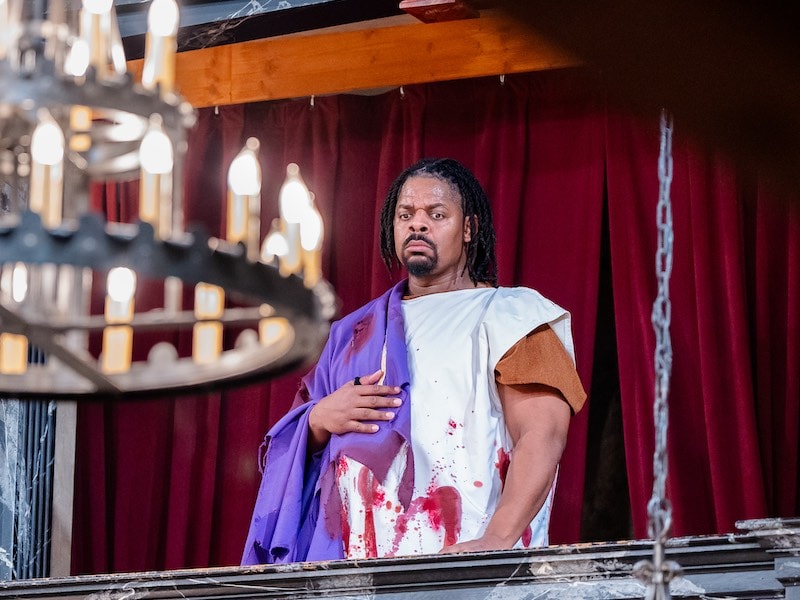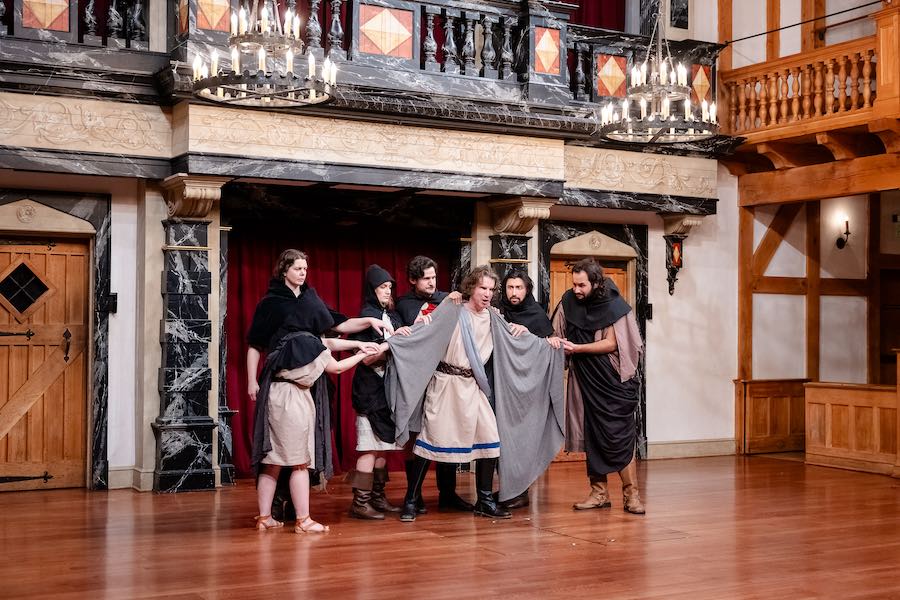Of all the dirty little secrets about William Shakespeare, for my money the biggest one is this: the Bard never took a single English class in his life. Unlike the rest of us, he didn’t waste his adolescence drawing sentence diagrams and expounding on the virtues of the subjunctive clause. His eloquence, his genius, consists primarily in the fact that as the son of a public official, he could attend the local Latin school in Stratford-on-Avon. And it is in Latin school that he memorized and performed the great orations of Antiquity, in the original tongue—Cicero’s invective, Julius Caesar’s self-serving histories of the wars, and last but not least the vivid tales surrounding Caesar’s assassination and the chaos that followed.
Shakespeare’s Julius Caesar remains the gold standard for eloquence; the funeral orations alone are as epic an acting challenge as Hamlet’s or Richard III’s soliloquies. Shakespeare knew what he was up against; his audience knew their Latin just as well as he did, they had all drilled down into the fundamentals of oratory and persuasion. He had to labor to come up with the English-language equivalent of the stellar Latin of Antiquity, and succeeded beyond his contemporaries’ wildest dreams.
I mean, we’re still staging his play.

The American Shakespeare Center’s new production of Julius Caesar is a fresh take, and a welcome one, on a classic political drama. Although somewhat skewed in its portrayal of its characters (Brutus, for example, was far from the innocent portrayed here), the language alone is worth the price of admission, the oratory rock solid, and the one-liners are just as significant as ever.
Kenn Hopkins Jr., as Caesar, reminds us that this Roman dictator’s power, and his faith in his own instincts (while flawed, in the final analysis), were unshakable. In the musical pre-show, Hopkins also shows off his musical chops with a stirring take on the O’Jays’ hit “The Back Stabbers.”
As the assassin-in-chief, Aidan O’Reilly offers us a stoical, cautious Brutus, righteous but slow to burn. The fact that he saves his most violent outbursts for his friend and co-conspirator Cassius (the lean and mean Philip Orazio) reminds us that Shakespeare’s Brutus was a man of principle, and an enemy of the greed and ambition that Caesar had represented. Corrie Green, as his wife Portia, shows the determination of a woman who regards herself in every way an equal partner in everything Brutus contemplates; this is a Portia whose suicide later in the play is of a piece with her character.

Among the conspirators, Summer England’s turn as Decius Brutus stands out—her ability to play on Caesar’s sense of his own invincibility, and to persuade Caesar to go out on the Ides of March after all, is nicely done. Likewise Annabelle Rollison’s Caska, whose subtle wit raises more than a few laughs (hers is the famous quip “…it was Greek to me”).
The highlight of any production, of course, is the funeral scene, which certainly rivets audiences at a time when popular discontent has proven to be so destructive to our own republic. O’Reilly’s Brutus gives a sober but passionate defense of the assassination, and then leaves the podium to the production’s Mark Antony. Sarah Fallon’s “Friends, Romans, Countrymen” is as stirring and as blatantly, appallingly propagandistic a turn as you will see. Her command of the language, her understanding of the need to stir the people’s emotions to a fever pitch while projecting calm, her defaming the assassins while saying they were “honorable men”—all of it is well, well done.

With this production, the musical selections are remarkably evocative of the atmosphere of paranoia and revenge: from the O’Jays to Tears for Fears (“Everybody Wants to Rule the World”) and Blondie (“One Way or Another”)—with Taylor Swift’s great kiss-off “Look What You Made Me Do/Don’t Blame Me” and The Devil Makes Three’s “Tow” rounding it out in a more contemporary vein. And in each case, you can hear a slight tweak of the lyrics to remind us that the songs aren’t just for fun; they reflect on the sober nature of the action of the stage.
This Julius Caesar is a timely reminder of how recklessness and greed can destroy things. For Shakespeare, the path to the Roman Empire may have seemed inevitable; he could mourn the loss of Brutus, but shrug at the implications of what came next. We who value our Republic can come away from this play with a great deal more.
Running Time: Two hours and 30 minutes including one intermission.
Julius Caesar plays through June 8, 2024, in repertory with Pride and Prejudice (through June 8) and A Midsummer Night’s Dream (March 14 through June 9) presented by American Shakespeare Center at the Blackfriars Playhouse, 10 South Market Street, Staunton, VA. For tickets ($34–$71), call the box office at (540) 851-3400, or purchase them online.
Cast and artistic team credits for Julius Caesar are online here (scroll down).
COVID Safety: American Shakespeare Center strongly encourages patrons to mask when possible. ASC’s complete COVID-19 Safety Visitor’s Guide is here.





“Of all the dirty little secrets about William Shakespeare, for my money the biggest one is this: the Bard never took a single English class in his life.”
Right you are! It’s not clear that Shakspere, the Merchant of Stratford, even saw the inside of a classroom.